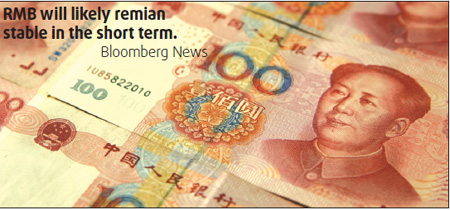Yuan appreciation unlikely for time being: analysts
Updated: 2009-11-26 07:28
By George Ng(HK Edition)
|
|||||||||

HONG KONG: The Chinese central bank's recent choice of wording on its yuan policy has raised market expectations for imminent yuan appreciation. But economists and analysts who are experts on the subject believe a rise in the yuan is out of the question, for now.
In its third-quarter monetary policy report released earlier this month, the People's Bank of China departed from its well-worn language on the yuan policy.
"Following the principles of initiative, controllability and gradualism, with reference to international capital flows and changes in major currencies, we will improve the yuan exchange rate formation mechanism," the central bank said in the report.
The new statement, which dropped the usual wording of "keeping the yuan basically stable at a reasonable and balanced level", came just days ahead of US president Barrack Obama's Beijing trip last week, raising expectations for a rise in the yuan after it has virtually gotten stuck at around 6.83 per US dollar since the middle of last year.
However, analysts said there is an absence of the right economic setting that warrants a rise in the yuan for the time being, singling out the continuous weakness in exports and the lack of maneuverability in monetary policy.
"It is impossible for the central government to allow the yuan to appreciate now," said Liu Xin, an economist at Bank of Communications, who specializes in macroeconomics and foreign exchange research, because, he said, "The recovery in the country's exports remains feeble."
With exports - which used to be one of the three main engines of the country's economic growth - remaining weak, the central government remains under pressure to rely more on investment and domestic consumption to support economic growth.
However, huge investments made in the past, particularly those made under the massive stimulus package implemented by the government after the global financial tsunami last year, have raised concerns about overlapping projects and overcapacity, which can cause long-term economic risks.
Meanwhile, domestic consumption, though growing robustly for years, is still far from strong enough to replace the contribution by exports to economic growth.
Therefore, the central government continues to strongly support the export sector with various incentives, such as tax rebates, to help sustain economic growth.
There is no reason for the government to support exports with incentives on the one hand, and to suppress the same with negative foreign exchange factors on the other hand, analysts believe.
"A rise in the yuan's value now will add pressure to exporters who have been suffering from the global economic crisis," said Daniel Chan, a senior strategist at DBS Bank.
Many of the country's exporters are producers of low value-added products and earn only 3-5 percent profit currently, some economists note. A rise in the yuan will easily wipe out their profit and threaten their survival, Chan said.
Thousands of factories in the Pearl River delta and elsewhere in the country have collapsed as a result of the global economic crisis, sending many migrant workers home jobless, and undermining the government's efforts to boost consumption. Another major obstacle cited by analysts for yuan appreciation is the country's lack of maneuverability in its monetary policy now.
An increase in the yuan's value will likely boosts expectations for further appreciation as it did before, and therefore attract more hot money, which could only help further inflate the "bubble" in the domestic asset market, Bank of Communications' Liu said.
A rising chorus of foam-spotters believes the massive stimulus package implemented by the government to shore up the economy after the global financial crisis is blowing up a bubble in the domestic asset market, though others dispute that view.
The central government will now find itself short of monetary instruments to prevent the bubble from growing in case more hot money pours in, analysts believe.
"Economic growth in the country is not strong enough yet for the government to withdraw its loose monetary policy," DBS Bank's Chan explained.
While a rise in the yuan is out of the question for now, it is possible that the currency will be allowed to appreciate by the middle of next year, Bank of Communications' Liu said.
US President Barack Obama told Chinese leaders during his Beijing trip that Washington expects to see a "more flexible" yuan exchange rate by next summer, US ambassador to China, Jon Huntsman, told Bloomberg earlier.
There could be some kind of mutual understanding on that time frame based on some untold pre-conditions, analysts believe.
By then, the domestic economy should have grown stronger and see mild inflationary pressure, which will provide room for the central bank to tighten monetary policy when needed, Liu said. In the interim, the contribution of exports to economic growth is expected to turn positive, he added.
(HK Edition 11/26/2009 page4)